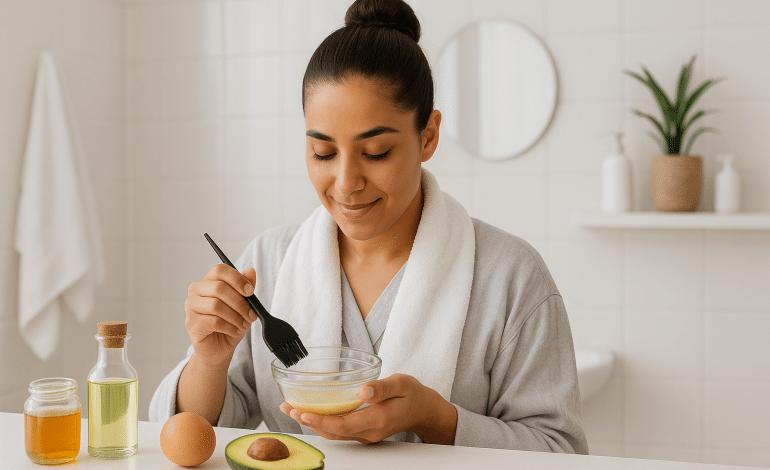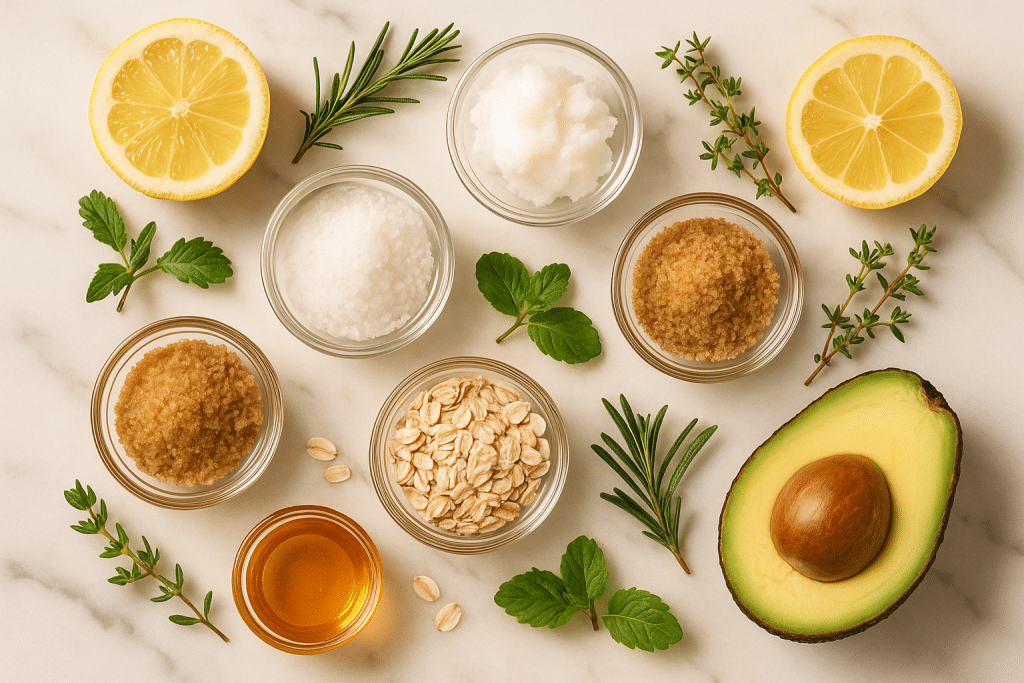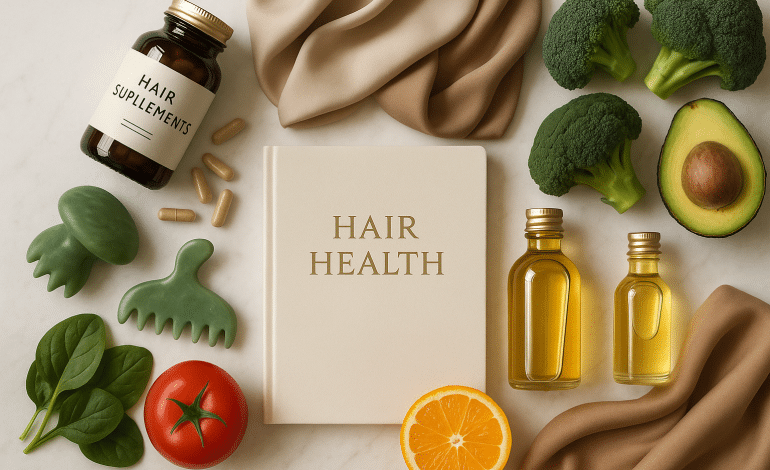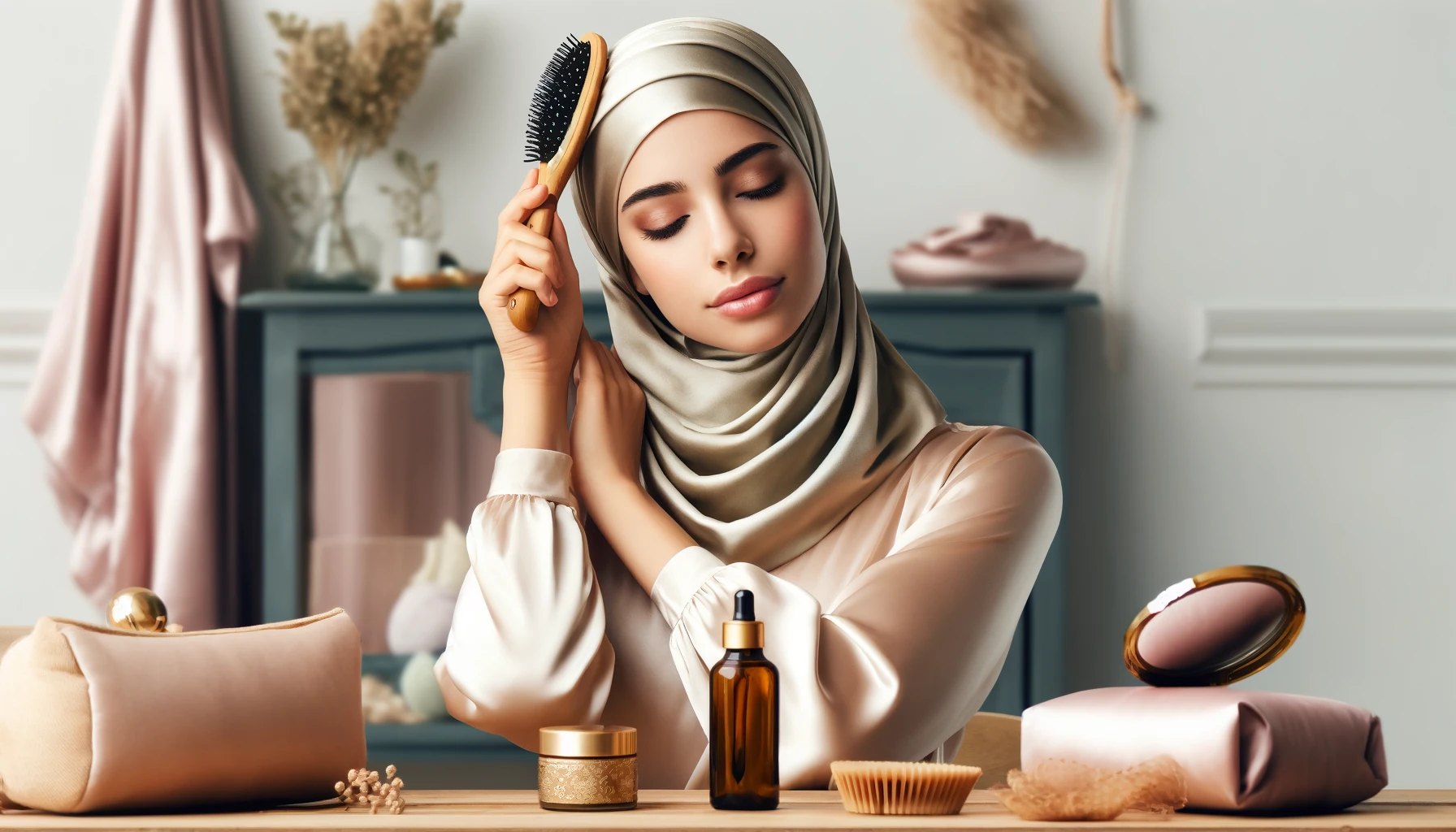7 Powerful DIY Scalp Scrubs for Hijabis That Eliminate Dandruff Fast

Why DIY Scalp Scrubs for Hijabis Are Essential for Healthy Hair
DIY scalp scrubs for hijabis offer a natural, effective solution to one of the most common challenges faced by women who wear hijab regularly—dandruff and scalp irritation. The unique environment created by consistent hijab wearing can sometimes lead to increased moisture retention, reduced air circulation, and buildup of oils and dead skin cells that contribute to dandruff formation.
Unlike commercial treatments that often contain harsh chemicals, DIY scalp scrubs for hijabis use gentle, natural ingredients that cleanse without stripping the scalp of essential oils. These homemade treatments are specifically designed to address the particular needs of hijabi women, taking into account factors like frequent washing requirements, sensitivity to strong fragrances, and the need for treatments that work effectively within modest beauty routines.
The beauty of DIY scalp scrubs for hijabis lies in their accessibility, affordability, and customization potential. You can create powerful anti-dandruff treatments using common kitchen ingredients, adjusting recipes based on your specific scalp needs and sensitivities. These natural solutions not only combat dandruff but also promote overall scalp health, leading to stronger, more beautiful hair that feels comfortable under your hijab.
In this comprehensive guide, we’ll explore seven proven DIY scalp scrubs for hijabis that effectively eliminate dandruff while nourishing your scalp and hair. Each treatment is designed with the hijabi lifestyle in mind, ensuring maximum effectiveness with minimal fuss.
Understanding Dandruff in Hijabis: The Unique Challenges
Before diving into specific DIY scalp scrubs for hijabis, it’s crucial to understand why dandruff can be more prevalent among women who wear hijab regularly and how natural treatments can address these specific challenges.
The Science Behind Hijab-Related Scalp Issues
According to dermatological research published in the International Journal of Dermatology, consistent head covering can create conditions that may contribute to scalp issues:
- Reduced air circulation: Limited airflow can trap moisture and heat
- Increased oil production: Warm, humid conditions may stimulate sebaceous glands
- Product buildup: Frequent washing and styling products can accumulate
- Friction: Constant fabric contact may irritate sensitive scalps
- Bacterial growth: Warm, moist environments can promote bacterial overgrowth
Why DIY Solutions Work Better for Hijabis
DIY scalp scrubs for hijabis offer several advantages over commercial products:
- Gentle ingredients: Natural components are less likely to cause irritation
- Customizable formulations: Recipes can be adjusted for individual sensitivities
- No harsh chemicals: Avoid sulfates, parabens, and artificial fragrances
- Cost-effective: Kitchen ingredients are more affordable than specialized products
- Fresh preparation: Each batch is made fresh, ensuring maximum potency
The American Academy of Dermatology emphasizes that gentle, consistent care is often more effective than harsh treatments for managing dandruff and scalp sensitivities.
7 Proven DIY Scalp Scrubs for Hijabis

These carefully formulated DIY scalp scrubs for hijabis address different types of dandruff and scalp concerns while remaining gentle enough for regular use.
1. Coconut Oil and Sea Salt Exfoliating Scrub
This powerhouse combination in DIY scalp scrubs for hijabis provides gentle exfoliation while deeply moisturizing the scalp.
Ingredients:
- 3 tablespoons virgin coconut oil
- 2 tablespoons fine sea salt
- 1 teaspoon honey
- 3 drops tea tree oil (optional)
Benefits:
- Coconut oil’s antifungal properties combat dandruff-causing yeast
- Sea salt gently removes dead skin cells and excess oil
- Honey provides additional antimicrobial benefits
- Tea tree oil offers natural antifungal support
Application method: Warm coconut oil slightly until soft but not liquid. Mix with sea salt and honey until well combined. Apply to damp scalp, massage gently for 2-3 minutes, then rinse thoroughly with warm water followed by your regular shampoo routine.
2. Brown Sugar and Olive Oil Treatment
Among the most nourishing DIY scalp scrubs for hijabis, this combination provides gentle exfoliation with deep conditioning benefits.
Ingredients:
- 4 tablespoons brown sugar
- 3 tablespoons extra virgin olive oil
- 1 tablespoon apple cider vinegar
- 2 drops lavender essential oil
Benefits:
- Brown sugar’s fine texture provides gentle exfoliation
- Olive oil deeply moisturizes and reduces inflammation
- Apple cider vinegar balances scalp pH and removes buildup
- Lavender oil soothes irritation and promotes relaxation
Application method: Combine all ingredients until they form a paste-like consistency. Apply to sections of damp scalp, massage gently in circular motions for 3-5 minutes, focusing on areas with visible flakes. Rinse thoroughly and follow with a mild shampoo.
3. Oatmeal and Yogurt Soothing Scrub
This gentle option among DIY scalp scrubs for hijabis is perfect for sensitive scalps prone to irritation.
Ingredients:
- 1/2 cup ground oatmeal
- 1/4 cup plain Greek yogurt
- 1 tablespoon aloe vera gel
- 1 teaspoon jojoba oil
Benefits:
- Oatmeal contains saponins that cleanse without stripping
- Yogurt’s lactic acid gently exfoliates and moisturizes
- Aloe vera reduces inflammation and soothes irritation
- Jojoba oil mimics natural sebum for balanced hydration
Application method: Grind oatmeal to a fine powder using a blender or coffee grinder. Mix with yogurt, aloe vera, and jojoba oil until smooth. Apply to scalp, massage gently for 2-3 minutes, then leave on for an additional 5 minutes before rinsing thoroughly.
4. Baking Soda and Lemon Clarifying Treatment
For hijabis dealing with excessive buildup, this clarifying scrub among DIY scalp scrubs for hijabis provides deep cleansing action.
Ingredients:
- 2 tablespoons baking soda
- 1 tablespoon fresh lemon juice
- 2 tablespoons water
- 1 teaspoon rosemary oil
Benefits:
- Baking soda neutralizes odors and removes stubborn buildup
- Lemon juice provides natural antifungal properties
- Rosemary oil stimulates circulation and promotes healthy hair growth
- The combination balances scalp pH
Application method: Mix baking soda with water to form a paste, then add lemon juice and rosemary oil. Apply to scalp, focusing on areas with heavy buildup. Massage gently for 2 minutes, avoiding vigorous scrubbing. Rinse thoroughly and follow with a conditioning treatment.
Note: Use this treatment only once per week as baking soda can be drying with frequent use.
5. Rice Water and Honey Nourishing Scrub
This traditional ingredient combination makes one of the most effective DIY scalp scrubs for hijabis for promoting overall scalp health.
Ingredients:
- 1/2 cup rice water (fermented for 24 hours)
- 2 tablespoons raw honey
- 1 tablespoon fine sugar
- 1 teaspoon vitamin E oil
Benefits:
- Rice water contains vitamins and minerals that nourish the scalp
- Honey provides antimicrobial properties and moisture
- Sugar offers gentle physical exfoliation
- Vitamin E oil protects against oxidative stress
Application method: Prepare rice water by soaking 1/2 cup rice in 2 cups water for 30 minutes, then strain and let ferment for 24 hours. Mix 1/2 cup of this rice water with honey, sugar, and vitamin E oil. Apply to scalp, massage gently, and leave for 10 minutes before rinsing.
6. Green Tea and Epsom Salt Detox Scrub
This antioxidant-rich option among DIY scalp scrubs for hijabis helps remove toxins while providing anti-inflammatory benefits.
Ingredients:
- 1/2 cup strong green tea (cooled)
- 3 tablespoons Epsom salt
- 1 tablespoon coconut oil
- 2 drops peppermint essential oil
Benefits:
- Green tea’s antioxidants fight free radical damage
- Epsom salt removes buildup and improves circulation
- Coconut oil moisturizes and has antifungal properties
- Peppermint oil stimulates scalp and provides cooling sensation
Application method: Brew strong green tea and let cool completely. Mix with Epsom salt, coconut oil, and peppermint oil. Apply to scalp in sections, massage for 3-4 minutes, then rinse thoroughly. The cooling sensation makes this perfect for summer use.
7. Avocado and Coffee Grounds Intensive Treatment
The most luxurious of our DIY scalp scrubs for hijabis, this treatment provides intense nourishment while effectively removing buildup.
Ingredients:
- 1/2 ripe avocado
- 2 tablespoons used coffee grounds (dried)
- 1 tablespoon argan oil
- 1 teaspoon raw honey
Benefits:
- Avocado provides healthy fats and vitamins for scalp nourishment
- Coffee grounds stimulate circulation and provide gentle exfoliation
- Argan oil deeply moisturizes and adds shine
- Honey offers antimicrobial protection
Application method: Mash avocado until smooth, then mix with dried coffee grounds, argan oil, and honey. Apply to scalp and hair lengths, massage gently for 5 minutes, then leave on for 15 minutes before rinsing thoroughly with warm water.
For more detailed guides on natural hair care, visit our comprehensive hair health section.
How to Apply DIY Scalp Scrubs for Hijabis Safely and Effectively
Proper application of DIY scalp scrubs for hijabis ensures maximum benefits while preventing irritation or damage.
Pre-Treatment Preparation
Before applying any DIY scalp scrubs for hijabis:
- Patch test: Always test new ingredients on a small skin area 24 hours before full application
- Clean workspace: Prepare treatments in a clean environment using sanitized tools
- Hair preparation: Work with damp (not soaking wet) hair for better product distribution
- Section planning: Divide hair into manageable sections for thorough coverage
Application Techniques
Gentle Massage Methods When applying DIY scalp scrubs for hijabis:
- Use fingertips, never fingernails, to avoid scratching
- Work in small, circular motions
- Focus on the scalp, not the hair lengths
- Apply gentle pressure—let the ingredients do the work
Timing Considerations
- Most scrubs should be massaged for 2-5 minutes
- Avoid over-scrubbing, which can cause irritation
- Some treatments benefit from additional sitting time after massage
- Always rinse thoroughly to prevent residue buildup
Post-Treatment Care
After using DIY scalp scrubs for hijabis:
- Rinse with lukewarm water to remove all residue
- Follow with a gentle, sulfate-free shampoo if needed
- Apply a light conditioner to hair lengths (avoid the scalp)
- Allow hair to air dry when possible to prevent heat damage
Frequency and Maintenance Guidelines
Understanding how often to use DIY scalp scrubs for hijabis is crucial for achieving optimal results without causing irritation.
Recommended Usage Frequency
Normal to Oily Scalps:
- Use DIY scalp scrubs for hijabis 1-2 times per week
- Focus on gentle, consistent exfoliation
- Monitor scalp response and adjust frequency as needed
Dry or Sensitive Scalps:
- Limit DIY scalp scrubs for hijabis to once per week or every 10 days
- Choose gentler formulations with more moisturizing ingredients
- Always follow with conditioning treatments
Severe Dandruff Cases:
- Begin with twice-weekly applications of mild DIY scalp scrubs for hijabis
- Gradually reduce frequency as symptoms improve
- Consult a dermatologist if symptoms persist after 4-6 weeks
Creating a Maintenance Routine
Weekly Schedule Example:
- Day 1: Oil pre-treatment (optional)
- Day 2: DIY scalp scrub for hijabis application
- Day 3-4: Regular gentle washing
- Day 5: Deep conditioning treatment
- Day 6-7: Minimal manipulation, protective styling
Ingredients to Avoid and Safety Considerations
While DIY scalp scrubs for hijabis are generally safe, certain ingredients and practices should be avoided to prevent irritation or adverse reactions.
Ingredients to Use Sparingly
High-Alkaline Ingredients:
- Limit baking soda use to once weekly maximum
- Always neutralize with acidic ingredients like lemon juice or vinegar
- Monitor scalp response carefully
Essential Oils:
- Never use undiluted essential oils directly on scalp
- Limit to 2-3 drops per treatment
- Avoid photosensitizing oils like citrus before sun exposure
Red Flag Ingredients for Sensitive Scalps
Avoid these ingredients in DIY scalp scrubs for hijabis if you have sensitive skin:
- Cinnamon or spice oils (can cause burning)
- Coarse salts or sugars (may cause micro-tears)
- High concentrations of acids (can disrupt pH balance)
- Alcohol-based ingredients (can cause excessive drying)
When to Consult a Professional
Seek dermatological advice if:
- Symptoms worsen after using DIY scalp scrubs for hijabis
- You experience severe itching, burning, or pain
- Dandruff persists despite consistent treatment
- You notice hair loss or thinning
- Scalp becomes red, swollen, or develops open sores
Frequently Asked Questions About DIY Scalp Scrubs for Hijabis
How often should I use DIY scalp scrubs for hijabis if I wear hijab daily?
For daily hijab wearers, using DIY scalp scrubs for hijabis 1-2 times per week is typically ideal. Daily hijab wearing can create conditions that promote buildup, making regular exfoliation beneficial. However, start with once weekly and adjust based on your scalp’s response. If you notice increased oiliness or flaking, you may benefit from twice-weekly treatments, while sensitive scalps might need less frequent applications.
Can DIY scalp scrubs for hijabis worsen dandruff initially?
It’s possible to experience a temporary increase in flaking when you first start using DIY scalp scrubs for hijabis. This “purging” period occurs as the treatments remove built-up dead skin cells and debris. This typically resolves within 2-3 weeks of consistent use. However, if irritation or excessive flaking persists beyond this period, discontinue use and consider gentler formulations or consult a dermatologist.
Are DIY scalp scrubs for hijabis safe during pregnancy or breastfeeding?
Most DIY scalp scrubs for hijabis using basic ingredients like coconut oil, honey, sugar, and oatmeal are generally safe during pregnancy and breastfeeding. However, avoid essential oils during pregnancy unless approved by your healthcare provider, as some can affect hormone levels. Always consult your doctor before trying new treatments during pregnancy or while nursing, and stick to the gentlest formulations.
How do I know if my dandruff requires professional treatment versus DIY scalp scrubs for hijabis?
DIY scalp scrubs for hijabis are effective for mild to moderate dandruff characterized by white flakes and occasional itching. Seek professional help if you experience: severe itching that disrupts sleep, thick yellow or greasy scales, red or inflamed patches, hair loss, or symptoms that don’t improve after 6-8 weeks of consistent natural treatment. These may indicate seborrheic dermatitis or other conditions requiring medical intervention.
Can I use DIY scalp scrubs for hijabis if I have colored or chemically treated hair?
Yes, but with modifications. DIY scalp scrubs for hijabis focus on the scalp rather than hair lengths, making them generally safe for colored hair. However, avoid lemon juice or vinegar-based scrubs immediately after chemical treatments, as these can affect color stability. Wait at least 48 hours after coloring before using any scalp treatments, and always focus application on the scalp area only, avoiding the colored hair lengths.
Embracing Natural Scalp Health with DIY Solutions
DIY scalp scrubs for hijabis offer a gentle, effective, and affordable approach to managing dandruff while supporting overall scalp health. These natural treatments respect both your beauty needs and your hijabi lifestyle, providing solutions that work within your daily routine without compromising your values or comfort.
The seven treatments outlined in this guide offer options for every scalp type and sensitivity level, from the gentle oatmeal and yogurt scrub for sensitive scalps to the intensive avocado and coffee treatment for deep nourishment. By incorporating these DIY scalp scrubs for hijabis into your regular hair care routine, you can achieve a healthy, comfortable scalp that feels fresh and clean under your hijab.
Remember that consistency is key when using DIY scalp scrubs for hijabis. Natural treatments work gradually but effectively, building healthier scalp conditions over time rather than providing instant but temporary relief. Be patient with the process, adjust formulations based on your specific needs, and don’t hesitate to consult professionals if concerns arise.
The journey to a healthy scalp is personal and unique to each individual. These DIY scalp scrubs for hijabis provide the foundation for that journey, empowering you to take control of your scalp health using safe, natural ingredients you can trust.
At Mohajba, we believe that natural beauty care should be accessible, effective, and aligned with your lifestyle. Our commitment to supporting hijabi women includes providing tried-and-tested solutions for every aspect of modest beauty care.
Follow us on Instagram, Facebook, and TikTok for more DIY scalp scrubs for hijabis, natural beauty tips, and hijabi hair care inspiration.
Visit our website to explore our complete collection of natural beauty guides, product recommendations, and expert tips for maintaining healthy hair and scalp under hijab.
Your scalp health matters—discover the difference that gentle, natural DIY scalp scrubs for hijabis can make in your daily comfort and confidence.






